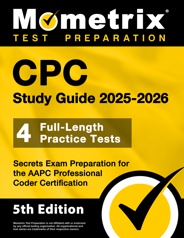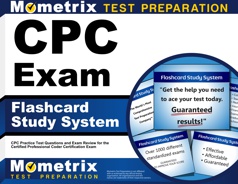The American Academy of Professional Coders (AAPC) Certified Professional Coder (CPC) exam is a credential used to demonstrate expertise in coding medical services and procedures performed by physicians, including coding patient symptoms, diagnoses, and diagnostic tests.
Click “Start Test” above to take a free CPC practice test, and check out our premium-quality CPC test prep resources by clicking the links below!
Is the CPC Exam Right for Me?
Successful completion of the CPC Exam requires you to have high-level medical terminology, anatomy, and pathophysiology knowledge and an understanding of CPT procedure codes, HCPCS Level II supply codes, and ICD-10-CM diagnosis codes.
If you have this understanding, the CPC Exam is an excellent way to showcase your knowledge and expertise, increase your employment opportunities, and potentially increase your salary!

Eligibility
To sit for the CPC exam, you must meet the following requirements:
- Demonstrate proficiency in evaluation and management, anesthesia, surgery, radiology, pathology, and medicine
- Possess sound knowledge of medical coding guidelines and regulations
- Exhibit mastery of anatomy, physiology, and medical terminology necessary to code diagnosis and services
- Understand how to integrate medical coding and payment policy changes into the reimbursement process
You can meet these requirements through prior medical coding experience or an AAPC-approved training program.
Test Outline
The Certified Professional Coder exam contains 100 multiple-choice questions, and you will be given 4 hours to complete it.
The questions are split into 17 knowledge areas and one set of 10 cases:
The questions in this section cover surgical procedures performed on the integumentary system, including:
- Skin
- Subcutaneous
- Nails
- Pilonidal cysts
- Repairs
- Destruction
- Breast
2. 20,000 Series CPT (6 questions)
The questions in this section cover surgical procedures performed on the musculoskeletal system.
3. 30,000 Series CPT (6 questions)
The questions in this section focus on surgical procedures performed on the following:
- Respiratory system
- Cardiovascular system
- Hemic system
- Lymphatic system
- Mediastinum
- Diaphragm
4. 40,000 Series CPT (6 questions)
The questions in this section focus on your knowledge of surgical procedures performed on the digestive system.
5. 50,000 Series CPT (6 questions)
The questions in this section will challenge your knowledge of surgical procedures performed on the following systems:
- Urinary system
- Male reproductive system
- Female reproductive system (including maternity and delivery)
- Endocrine system
6. 60,000 Series CPT (6 questions)
The questions in this section assess your knowledge of coding surgical procedures performed on the nervous system.
7. Evaluation and Management (6 questions)
The questions in this section assess your knowledge of proper coding related to place and level of services. It also includes questions on coding for the following:
- Preventative medicine
- Virtual services
- Neonatal and pediatric critical care
- Intensive care
- Prolonged services
- Chronic care
- Transitional care
- Case management
- Care plan oversight
8. Anesthesia (4 questions)
The questions in this section assess your knowledge of the coding requirements for the following:
- Time reporting
- Qualifying circumstances
- Physical status modifiers
- Anesthesia for surgical, diagnostic, and obstetric services
9. Radiology (6 questions)
The questions in this section focus on diagnostic and interventional radiology.
10. Laboratory/Pathology (6 questions)
The questions in this section focus on your knowledge of the following:
- Organ and disease panels
- Rug testing
- Therapeutic drug assays
- Evocation/suppression testing
- Consultations
- Urinalysis
- Molecular pathology
- MAAA
- Chemistry
- Hematology and coagulation
- Immunology
- Transfusions
- Microbiology
- Anatomic pathology
- Cytopathology
- Cytogenetic studies
- Surgical pathology
- In vivo and reproductive coding
11. Medicine (6 questions)
The questions in this section cover multiple specialty-specific coding scenarios.
12. Medical Terminology (4 questions)
The questions in this section assess your understanding of medical terminology for all systems.
13. Anatomy (4 questions)
The questions in this section assess your knowledge of human anatomy for all systems.
14. ICD-10-CM/Diagnosis (5 questions)
The questions in this section assess your proficiency in diagnosis for all chapters in the ICD-10-CM and your knowledge of the ICD-10-CM Official Guidelines for Coding and Reporting.
15. HCPCS Level II (3 questions)
The questions in this section focus on modifiers, supplies, medications, and professional services for Medicare patients.
16. Coding Guidelines (7 questions)
The questions in this section assess your understanding and expertise of the ICD-10-CM Official Guidelines for Coding and Reporting, CPT coding guidelines and parenthetical notes, and modifier use.
17. Compliance and Regulatory (3 questions)
The questions in this section evaluate your knowledge of compliance and regulations that pertain to the following:
- Services covered under Medicare Parts A, B, C, and D
- Payment coding
- Place of service reporting
- Fraud and abuse
- NCCI edits
- NCD/LCD
- HIPAA
- ABNs
- RVUs
18. Cases (10 questions)
Ten cases are presented to evaluate your ability to code medical record documentation accurately. These cases may also test your knowledge of medical terminology, anatomy, compliance, and regulatory information.
Check Out Mometrix's CPC Study Guide
Get practice questions, video tutorials, and detailed study lessons
Get Your Study Guide
CPC Online Prep Course
If you want to be fully prepared, Mometrix offers an online CPC prep course designed to give you everything you need to succeed!
Here’s what you’ll find in the CPC course:
- 30+ Review Lessons Covering Every Topic
- 400 CPC Practice Questions
- 250+ Digital Flashcards
- Money-back Guarantee
- Mobile Access
Everyone learns differently, so we’ve tailored the CPC online prep course to ensure every learner has what they need to prepare for the CPC exam.
Click below to check it out!
Registration
To register for the exam, you must be an AAPC member, which costs $190 ($125 for students). Once you have joined AAPC, you can use your account to register for the exam.
The exam itself costs $349 for one attempt or $449 for two. If you paid to take the test twice but you pass the exam on the first take, you do not get a refund of the money spent on the second attempt.
Test Day
When you register, you will have the option to choose in-person testing or remote testing (LPR).
There are similarities between these two methods when it comes to the day of the exam. Both formats require a current, valid, government-issued form of identification. Both ways also allow you to bring a basic manual calculator and handwritten notes specific to daily coding activities. Additionally, you are allowed three reference books
- The AMA Professional edition of the CPT
- Your choice of the ICD-10-CM Official Guidelines with highlighting, underlining, and brief notations needed for day-to-day coding
- Your choice of HCPCS Level II
Keep in mind that the exam questions are based on the current calendar year’s code sets, and you might be disadvantaged in using prior publications.
There are similarities in the disallowed items as well. You are not allowed to bring electronic devices with an on/off switch, devices capable of capturing and storing images, study guides, Procedural Coding Expert, CPT Plus! – PMIC, CPT Insider’s View – AMA, or the ICD-10-CM Easy Coder.
In-person Testing
On the day of your exam, you should arrive 15-30 minutes early at your exam location. You must also bring your photo ID, two No. 2 pencils, an eraser, a manual calculator, and your coding books and references. Keep your belongings in your car or at home; you are not allowed to bring anything not approved into the testing center.
After you show your ID to the testing center administrator, you will be directed to your testing station. You will complete a familiarization tutorial there, and your exam begins when you are finished with the tutorial.
You can take breaks during the exam period, but you will not regain the time you lose on your break.
Live Remote Proctoring
You will need to log on to the testing environment 5-10 minutes before your appointment time. By logging on early, you can troubleshoot issues like connecting to the testing platform, microphone issues, lagging internet, etc.
When your proctor signs on, present your government-issued photo ID. Then, rotate your camera around your space for the proctor’s approval. When your area is approved, replace your webcam, ensuring your face, fingers, keyboard, and keyboard area are always in the frame. Once the webcam is back in place, you cannot move out of its view.
A bottle of water, two No. 2 pencils, an eraser, a sheet of blank paper, approved reference materials, and a manual calculator are all allowed to be on your desk.
Exam Scoring
You need to answer 70 questions correctly to pass the exam. The correct answers are worth 1 point each, and they are combined to calculate your final score. Your results are released to your AAPC account seven to ten days after you take the exam. If you do not receive your test results after ten days, contact AAPC for guidance.
If you did not pass the exam, you can register to retake the exam. If you paid for the two-test bundle, there is no additional fee. If you did not pay for the two-test bundle, you would pay the $349 test registration fee.
You can take the exam as often as needed, but you will pay the full registration fee each time.
Check Out Mometrix's CPC Flashcards
Get complex subjects broken down into easily understandable concepts
Get Your Flashcards
How to Study
How to Study Effectively
Your success on CPC test day depends not only on how many hours you put into preparing but also on whether you prepared the right way. It’s good to check along the way to see whether your studying is paying off. One of the most effective ways to do this is by taking CPC practice tests to evaluate your progress. Practice tests are useful because they show exactly where you need to improve. Every time you take a free CPC exam practice test, pay special attention to these three groups of questions:
- The questions you got wrong
- The ones you had to guess on, even if you guessed right
- The ones you found difficult or slow to work through
This will show you exactly what your weak areas are and where you need to devote more study time. Ask yourself why each of these questions gave you trouble. Was it because you didn’t understand the material? Was it because you didn’t remember the vocabulary? Do you need more repetitions on this type of question to build speed and confidence? Dig into those questions and figure out how you can strengthen your weak areas as you go back to review the material.
Answer Explanations
Additionally, many CPC practice tests have a section explaining the answer choices. It can be tempting to read the explanation and think that you now have a good understanding of the concept. However, an explanation likely only covers part of the question’s broader context. Even if the explanation makes sense, go back and investigate every concept related to the question until you’re positive you have a thorough understanding.
Comprehend Each Topic
As you go along, keep in mind that the CPC practice test is just that: practice. Memorizing these questions and answers will not be very helpful on the actual test because it is unlikely to have any of the same exact questions. If you only know the right answers to the sample questions, you won’t be prepared for the real thing. Study the concepts until you understand them fully, and then you’ll be able to answer any question that shows up on the test.
Strategy for CPC Practice
When you’re ready to start taking practice tests, follow this strategy:
- Remove Limitations. Take the first test with no time constraints and with your notes and CPC study guide handy. Take your time and focus on applying the strategies you’ve learned.
- Time Yourself. Take the second practice test “open book” as well, but set a timer and practice pacing yourself to finish in time.
- Simulate Test Day. Take any other practice tests as if it were test day. Set a timer and put away your study materials. Sit at a table or desk in a quiet room, imagine yourself at the testing center, and answer questions as quickly and accurately as possible.
- Keep Practicing. Keep taking practice tests on a regular basis until you run out of practice tests or it’s time for the actual test. Your mind will be ready for the schedule and stress of test day, and you’ll be able to focus on recalling the material you’ve learned.
FAQs
Q
How long is the CPC exam?
A
The time limit for the exam is 4 hours.
Q
How many questions are on the CPC exam?
A
There are 100 questions on the exam.
Q
What is a passing score for the CPC exam?
A
To pass the exam, you will need to answer at least 70 questions correctly.
Q
How much does the CPC exam cost?
A
The exam costs $349.


